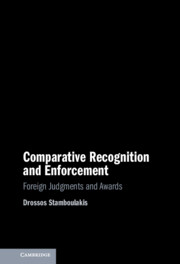Book contents
- Comparative Recognition and Enforcement
- Comparative Recognition and Enforcement
- Copyright page
- Contents
- Foreword
- Preface
- 1 Introduction
- Part I Transnational Recognition and Enforcement
- Part II Towards Increased Prospects for Judgments Recognition and Enforcement?
- 6 Overcoming Hurdles to Transnational Recognition and Enforcement
- 7 Legal Development
- 8 Towards ‘Transnationalised’ Recognition and Enforcement
- 9 Conclusion
- Bibliography
- Index
7 - Legal Development
Uniformity, Divergence and Evolution
from Part II - Towards Increased Prospects for Judgments Recognition and Enforcement?
Published online by Cambridge University Press: 10 November 2022
- Comparative Recognition and Enforcement
- Comparative Recognition and Enforcement
- Copyright page
- Contents
- Foreword
- Preface
- 1 Introduction
- Part I Transnational Recognition and Enforcement
- Part II Towards Increased Prospects for Judgments Recognition and Enforcement?
- 6 Overcoming Hurdles to Transnational Recognition and Enforcement
- 7 Legal Development
- 8 Towards ‘Transnationalised’ Recognition and Enforcement
- 9 Conclusion
- Bibliography
- Index
Summary
Chapter 7 takes a broader perspective, by considering how legal development or evolution occurs, or might occur, across each of the recognition and enforcement approaches studied in this book. To do so, I first compare and contrast the ‘internal’ measures that can be used to facilitate legal development. That is, features within the recognition and enforcement architecture itself that encourage or oblige autonomous interpretation or uniformity or are used to manage any divergences in interpretation and application. I next consider the likelihood of ‘external’ legal development or ‘evolution’. The potential for doing so turns in large part upon on the underlying legal architecture utilised: in the Commonwealth Model (a reciprocal statutory regime), the Brussels Model (now predominantly the product of EU Regulations) and the ‘global’ instruments (treaty models, requiring domestic implementation). The major focus in this section is on developments in the Brussels Model, as both the instruments in this model and the surrounding institutional frameworks surrounding European integration have undergone the most significant developments since their original formulation (compared to any other recognition and enforcement approach).
Keywords
- Type
- Chapter
- Information
- Comparative Recognition and EnforcementForeign Judgments and Awards, pp. 183 - 223Publisher: Cambridge University PressPrint publication year: 2022

